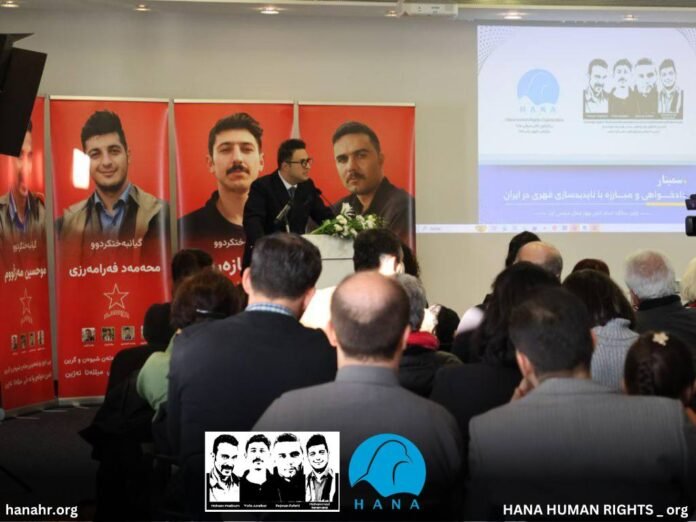On February 1, 2025, a seminar titled “Advocacy and the Fight Against Enforced Disappearances in Iran” was held in Cologne, Germany. The event was organized by the Advocacy Campaign for Four Executed Kurdish Political Prisoners and Hana Human Rights Organization to mark the first anniversary of the execution of four Kurdish political prisoners: Mohsen Mazloum, Pejman Fatehi, Vafa Azarbar, and Mohammad Faramarzi. The seminar was attended by lawyers, journalists, human rights activists, and families of victims seeking justice.
The event began with a minute of silence to honor the memory of the four executed Kurdish political prisoners and all victims of human rights violations in Iran.
Key Speakers and Topics
- Dr. Shirin Ebadi – “Retribution vs. Justice”
• Dr. Shirin Ebadi, a lawyer, Nobel Peace Prize laureate, and human rights advocate, was the first speaker. She discussed the fundamental differences between retribution and justice, explaining that retribution is based on vengeance, while justice is a civil movement within a democratic judicial system. - Dr. Faraz Firoozi – “The Crime of Enforced Disappearance in International Criminal Law”
• Dr. Firoozi examined the historical context of enforced disappearances, referencing cases in South America and Turkey. He then outlined the definition and legal implications of enforced disappearances under international law.
• He also discussed the ongoing legal efforts regarding the case of the four executed Kurdish prisoners and emphasized Hana Human Rights Organization’s commitment to providing legal support and consultation to other victims’ families. - Negin Shiraghaei – “The Importance of Transitional Justice in Pre-Transition Periods”
• Negin Shiraghaei, a renowned journalist and human rights activist, highlighted the human rights violations in the case of the four Kurdish political prisoners and the importance of seeking justice for their families.
• She emphasized that transitional justice mechanisms must be designed based on the demands of various ethnic, religious, gender, and sexual identity groups to ensure inclusivity. - Fariba Baloch – “The Bloody Friday of Zahedan”
• Fariba Baloch, a Baloch human rights activist, discussed the widespread human rights violations in Balochistan, focusing on the state-led systemic discrimination against the Baloch people.
• She presented a report on the judicial proceedings related to the Bloody Friday Massacre in Zahedan, criticizing the sham nature of the trial and stating that justice has been sacrificed for the interests of the Iranian regime.
• She stressed the need for national solidarity in the pursuit of justice.
Documentary Screening & Family Statements
In the second part of the seminar, a documentary was shown detailing the arrest, trial, and execution of the four Kurdish political prisoners. This was followed by a video message from Dr. Narges Eskandari, condemning their execution and expressing support for the families’ international legal efforts.
During the final segment, several victims’ families delivered statements regarding human rights violations in Iran:
• Zhino Beigzadeh Babamiri, the daughter of Rezgar Beigzadeh Babamiri, spoke about her father’s case. He was arrested and tortured for helping injured protesters in the Women, Life, Freedom movement. She revealed that he has been sentenced to 15 years in prison by a criminal court and may face the death penalty in the Revolutionary Court.
• Rada Fatehi, a former political prisoner, representing the Association of Injured Protesters of the Women, Life, Freedom Movement, voiced concerns about the rising human rights violations in Iran and reaffirmed the commitment to justice against the Islamic Republic.
• A German Parliament representative and political sponsor of Pakhshan Azizi also delivered a brief speech condemning her death sentence.
Final Statement of the Seminar
The seminar concluded with a final statement emphasizing that:
• Enforced disappearance is classified as a crime against humanity under international law.
However, the Islamic Republic of Iran has systematically used this practice since its establishment, particularly in Kurdistan, to instill fear and suppress dissent.
• Iran has one of the highest numbers of unresolved enforced disappearance cases registered with the UN Working Group on Enforced or Involuntary Disappearances.
• Many families cannot file complaints due to security pressures or fear retaliation from the regime.
• As part of the justice-seeking movement, families are committed to being a strong voice for all victims of this inhumane regime and will not stop until justice is served.
• The seminar called on human rights organizations, institutions, and activists to support these efforts and hold the Islamic Republic accountable through existing legal mechanisms.
• The families of victims and anyone affected by enforced disappearances in Iran were encouraged to contact Hana Human Rights Organization for legal advice and assistance in filing international complaints—free of charge.
Organizers
• Advocacy Campaign for Four Executed Kurdish Political Prisoners
• Hana Human Rights Organization
February 1, 2025 – Cologne, Germany























